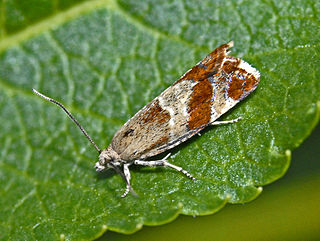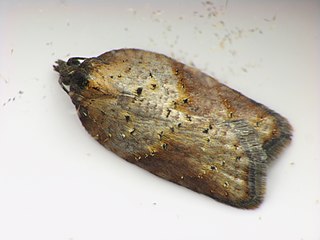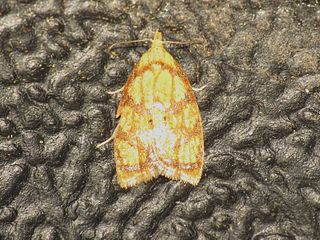Amboyna or amboina may refer to:

The Tortricidae are a family of moths, commonly known as tortrix moths or leafroller moths, in the order Lepidoptera. This large family has over 11,000 species described, and is the sole member of the superfamily Tortricoidea, although the genus Heliocosma is sometimes placed within this superfamily. Many of these are economically important pests. Olethreutidae is a junior synonym. The typical resting posture is with the wings folded back, producing a rather rounded profile.

Chlidanotinae is a subfamily of moths in the family Tortricidae.

Lobesia botrana, the European grapevine moth or European grape worm, is a moth of the family Tortricidae.
Amboyna is a genus of moths belonging to the subfamily Tortricinae of the family Tortricidae.

Epinotia cruciana, the willow tortrix, is a moth of the family Tortricidae.

Rhyacionia duplana, the summer shoot moth or Elgin shoot moth when referring to subspecies logaea, is a moth of the family Tortricidae. It is found from northern and central Europe to eastern Russia, China and Japan. It has also been reported from Korea, but it has not been found in recent studies.

Cryptophlebia ombrodelta, the litchi fruit moth or macadamia nut borer, is a moth of the family Tortricidae. The species was first described by Oswald Bertram Lower in 1898. It is native to India, Sri Lanka, Nepal, Indonesia, China, Taiwan, Vietnam, Thailand, western Malaysia, New Guinea, the Philippines, Japan, Guam, the Caroline Islands, Australia and has been introduced to Hawaii.

The Tortricini are a tribe of tortrix moths.

Tirathaba rufivena, the coconut spike moth, greater coconut spike moth or oil palm bunch moth, is a moth of the family Pyralidae. It is found from south-east Asia to the Pacific islands, including Malaysia, the Cook Islands, the Philippines and the tropical region of Queensland, Australia. They are considered as a minor pest.

Homona mermerodes is a species of moth of the family Tortricidae first described by Edward Meyrick in 1910. It was described from the Solomon Islands, but is also found in Australia (Queensland), New Guinea and Seram. The habitat consists of bamboo, secondary forests and alluvial forests.

Acleris bergmanniana, the yellow rose button moth, is a moth of the family Tortricidae. It is found from most of Europe to the eastern Palearctic realm.
Dichelopa achranta is a species of moth of the family Tortricidae. It is found in Australia, where it has been recorded from South Australia and Victoria.
Arotrophora anemarcha is a species of moth of the family Tortricidae first described by Oswald Bertram Lower in 1902. It is found in Australia, where it has been recorded from New South Wales, South Australia and Tasmania. The habitat consists of heathland and open forests at altitudes up to 200 meters.
Arotrophora euides is a species of moth of the family Tortricidae. It is found in Australia, where it has been recorded from Tasmania. The habitat consists of subalpine open woodland at altitudes between 860 and 950 meters.
Arotrophora siniocosma is a species of moth of the family Tortricidae. It is found in Australia, where it has been recorded from Queensland, New South Wales and Tasmania. The habitat consists of coastal heathland.
Arotrophora ochraceellus is a species of moth of the family Tortricidae. It is found in Australia, where it has been recorded from New South Wales and Victoria.
Syllomatia pirastis is a species of moth of the family Tortricidae. It is found in Australia, where it has been recorded from South Australia and Tasmania. The habitat consists of open forests.
Amboyna furcifera is a species of moth of the family Tortricidae. It is found in Indonesia, where it has been recorded from Ambon Island.
Marianne Horak is a Swiss-Australian entomologist who specialises in Australian Lepidoptera, particularly the phycitine and tortricid moths. She also did important research on the scribbly gum moths, during which eleven new species of Ogmograptis were discovered.









